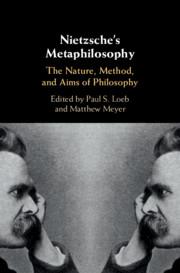Book contents
- Nietzsche’s Metaphilosophy
- Nietzsche’s Metaphilosophy
- Copyright page
- Contents
- Contributors
- Acknowledgments
- Note on Texts, Translations, and References
- Abbreviations
- Introduction
- Part I Evolving Metaphilosophies
- Part II The Nature of Philosophy
- Part III The Method of Philosophy
- Part IV The Aims of Philosophy
- Chapter 10 Nietzsche’s Aesthetic Conception of Philosophy
- Chapter 11 Metaphilosophy and Metapolitics in Nietzsche and Heidegger
- Chapter 12 Nietzsche’s Psychology of Metaphysics (or Metaphysics as Revenge)
- Chapter 13 “The Great Seriousness Begins”
- Bibliography
- Index
Chapter 13 - “The Great Seriousness Begins”
Nietzsche’s Tragic Philosophy and Philosophy’s Role in Creating Healthier Racialized Identities
from Part IV - The Aims of Philosophy
Published online by Cambridge University Press: 24 October 2019
- Nietzsche’s Metaphilosophy
- Nietzsche’s Metaphilosophy
- Copyright page
- Contents
- Contributors
- Acknowledgments
- Note on Texts, Translations, and References
- Abbreviations
- Introduction
- Part I Evolving Metaphilosophies
- Part II The Nature of Philosophy
- Part III The Method of Philosophy
- Part IV The Aims of Philosophy
- Chapter 10 Nietzsche’s Aesthetic Conception of Philosophy
- Chapter 11 Metaphilosophy and Metapolitics in Nietzsche and Heidegger
- Chapter 12 Nietzsche’s Psychology of Metaphysics (or Metaphysics as Revenge)
- Chapter 13 “The Great Seriousness Begins”
- Bibliography
- Index
Summary
In this chapter, I argue that one of Nietzsche’s goals in the late works was to experiment with ways in which his contemporaries might rethink the aims and methods of philosophy to enable the healthiest among them to affirm meaningful lives in the face of a tragic view of life. I further contend that Nietzsche’s tragic philosophy was meant to act as a counterpoint to the bad conscience and the ascetic ideal. It is meant to guide those who embrace it out of the ressentiment and world-weariness resulting from the “truths” of traditional philosophy to a more creative way of affirming life. Nietzsche referred to this as “tragic wisdom” and he proclaimed himself to be the “first tragic philosopher.” I conclude by indicating the importance of Nietzsche’s tragic approach for contemporary philosophy. In particular, I maintain that this approach could be fruitful for those looking for healthier ways of enacting race. Adopting a tragic view of our racialized lives entails an acceptance of the endemic and chronic nature of racism in our society without falling victim to the bad conscience-induced resignation and resentment that plague so many people today.
Keywords
- Type
- Chapter
- Information
- Nietzsche's MetaphilosophyThe Nature, Method, and Aims of Philosophy, pp. 247 - 264Publisher: Cambridge University PressPrint publication year: 2019



